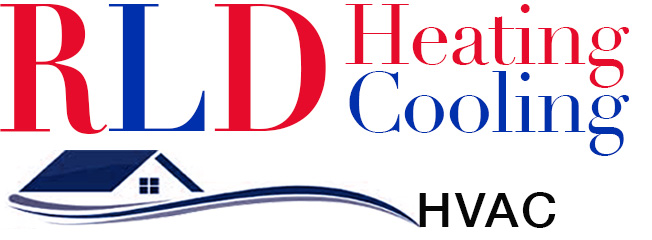Heat pump HVAC Los Angeles for heating and cooling your space! We are proud to provide this premium HVAC heating service.
Heat pumps are one of the most influential and energy-efficient alternatives to furnaces and air conditioners for all seasons because they can work as both. These are highly efficient at providing comfortable temperatures for your home because they don’t generate heat; instead, they transfer the air outside. When you start thinking about your furnace repair, or new heating system installation, it’s a very good time to start looking into the Heat Pump option.
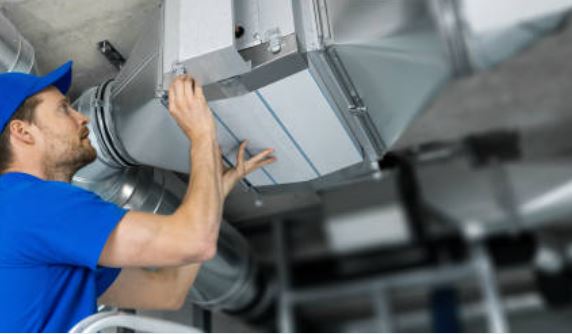
call 310-926-6368
Contact 24/7 our scheduling department today to make an appointment.
Like your refrigerator, the heat pump uses electricity to remove the heat from a space to cool it down.
During the winter season, the heat pumps move the cool air outside to keep your house warm, and during the summer season, it moves the hot air outside.
So, if you are building, replacing or renovating your HVAC system, a heat pump can be an option for you.
But what exactly is a heat pump? And is it an appropriate choice for you?
Well! This blog discusses everything you need to know about heat pumps.
So let’s get started!
What is a heat pump, and how does it work?

A heat pump (1) is a part of your cooling and heating system.
It is usually installed outside your house, and like air conditioning systems, it can cool your house, and like heaters and furnaces, it can even produce heat energy.
Heat pumps are powered by electricity, and instead of producing hot or cold air, they transfer heat using a refrigerant. So, you get year-round comfort from a single HVAC system.
But how does it function like an air conditioner and a heater simultaneously?
Well! We should get into the details to know about it.
Heat pump in air conditioning mode

When a heat pump is installed correctly, it can cool your house as nicely as an air conditioner. In addition to cooling, it also lowers the humidity levels of your house. Here is how it does:
- It pulls out the warm air into the ductwork with the help of a motorized fan.
- Then a compressor-like structure circulates refrigerant between the indoor evaporator and the outdoor condensing units.
- The hot indoor air then passes through the air handler while the refrigerant is pumped from the outdoor consenting coil to the indoor evaporating coil. The refrigerant then soaks up the heat in the air inside.
- This cold and dehumidifier air is passed into your house through the air vents connected to the indoor ducts.
- This cycle continues again and again until your space attains the desired temperature.
Heat pump in heater mode

Heat pumps usually were used in places that experienced mild winters.
However, with technological advancement, you can use the air source heat pump even in locations that experience harsh winters for an extended period.
Here is heat pumps work:
- A heat pump can easily switch from air conditioning to heating mode by reversing the cycle. So the outside coil function as the evaporator and the indoor coil as the condenser.
- Though the temperature outside is cold, the condenser coil absorbs sufficient heat energy, and the air is released by the evaporator coil inside.
- The cool air inside the house is pulled out into the ductwork with the help of a motorized fan.
- The refrigerant is then pumped from the inner coil to the outer, absorbing the heat from the air.
- The hot air is then pushed inside your house through the vents connected to the ductwork.
- This refrigeration cycle continues till the desired temperature is reached.
What are the components of a heat pump system?

If you want to know in detail about how heating and cooling systems work, it is better to understand a bit about the parts and components that make up your heat pump system.
A typical air-source heat pump system, also known as a split or two-part system, runs on electricity as a power source.
The system contains an outdoor unit and an indoor unit. The outdoor unit is quite similar to an air conditioner.
The heat pump works with the air handler to distribute your house’s warm and cold air. In addition to having electrical components and a fan, heat pumps also include:
- Compressor: A compressor moves the refrigerant through the system. Different heat pumps have different compressors that vary in functionality, though the primary function remains the same. Some heat pumps have quieter scroll compressors with a longer shelf life and better heating than piston compressors.
- Control boards: Control boards, as the name suggests, control the mode of your heat pump, whether it should be on heating or cooling or defrosting.
- Coils: The evaporator and the condenser coils heat and cool your house depending upon the directional flow of the refrigerant.
- Refrigerant: refrigerant is a material in the refrigeration lines that circulates through the indoor and outdoor unit.
- Reversing valves: It changes or reverses the flow of your refrigerant, which determines if your indoor space needs to be cooled or heated.
- Thermostat expansion valves: These valves regulate refrigerant flow just like a faucet valve regulates the water flow.
- The accumulator: The accumulator is a reservoir that adjusts the refrigerant charge depending upon the temperature outside.
- Ducts: These serve as air tunnels to the various spaces inside your house.
- Thermostat or control system: It regulates the temperature of your house.
Advantages and disadvantages of having a heat pump

Now that we know how a heat pump works, let’s find out what are the advantages and disadvantages of having a heat pump:
Advantages
There are several perks of having a heat pump:
- Lower energy expenses: According to government sources, a heat pump can deliver thrice more heat in your space than the electricity it consumes. It means that your electricity bills are minimal without trading your comfort. You might save as much as $1000 per year on electricity bills.
- Lower repair and maintenance costs: If you are using a heat pump alone as a source of your heating and cooling system, you have only a single system to maintain, diagnose and repair. So automatically, you can save a lot of money on these services as it lowers the total operation cost.
- More environmentally friendly: One of the best advantages of heat pump systems is that it consumes electricity rather than relying on natural gas or fossil fuels. So when you are not relying on gas or oil furnaces, you are doing your part on becoming environmentally friendly.
Disadvantages
If you live in moderate climates, a heat pump is an excellent choice for you.
But if the location you live in experiences extreme weather conditions, where the temperature is either too low or high, then a heat pump is not a comfortable choice. It means you have to employ additional sources for the coldest and the hottest days.
Also, the advantage of powering your heat pump with electricity turns out to be a disadvantage if the temperature levels are extreme. Your heat pump will struggle to bring your inner temperature to the comfort level, which will exert a lot of pressure on the electricity consumption.
Heat pumps are costlier than furnaces, both the units and installation. And talking about the shelf life, heat pumps tend to wear and tear quickly, usually lasting up to 15 years at max, while you can use the HVAC system for a more extended period.
What are the different types of heat pumps?

There are different varieties of heat pumps you can choose from depending upon your and your home’s needs.
Each of these heat pumps is suited for your different heating and cooling needs.
Here is the list of the different types of heat pumps you can choose from:
Split-system heat pumps
Like a traditional central air conditioner unit, a split system heat pump has two components- The outdoor and the indoor unit.
The only distinction is that the heat pump split system comes with two types of coils, both inside the indoor and the outdoor unit-
- The evaporator coil that absorbs heat and
- The condenser coil releases heat.
With this information, we can make out that, unlike the split system air conditioner, a split-system heat pump can absorb heat both inside and outside and release heat both ways. It is efficient at removing or adding hot or cold air to your space.
Packaged heat pump
A packaged heat pump works similarly to a ductless mini split system. The difference lies in the placement of coils. In a packaged heat pump, the coils are located in a single unit, and it is often placed on the roof of the building.
A packaged system uses ductwork to deliver hot and cold air by passing it through the roof and walls.
Confused between a split system and a packaged unit? The answer to this depends on the space in your house. If your roof is easily accessible, you can get one for your house because it is cheaper and easy to install and maintain.
Air source heat pumps
Air source heat pumps are an amazing option if you have existing ductwork in your house.
It has two units- An indoor air handling unit and an outdoor heat pumping unit.
The same ducts and vents are used for the air conditioner and the furnace.
However, an air-source heat pump is very cost-effective as they work in the same way as the gas and electric furnace.
If you reside in a city that experiences extreme cold, you must pair your heat pump with a furnace or an air conditioner as it will be a cheaper option.
Geothermal heat pumps

A geothermal heat pump is a highly efficient HVAC system that transfers heat between your house and the ground or the water source.
Though geothermal heat pumps are more expensive to install than the rest, they have a low operating cost as they take advantage of the ground and water temperatures.
There are some significant benefits of having a geothermal heat pump:
- They can reduce energy by 30%-60%.
- Controls humidity.
- They are reliable and sturdy.
- Easily fit in a wide variety of homes.
However, geothermal heat pumps are not appropriate for every house because they need a lot of criteria like the size of your lot, the landscape and the subsoil.
Absorption heat pumps
An absorption heat pump is a new system specially designed for residential systems.
Absorption heat pumps run on heat or thermal energy. Still, you can run them on a wide variety of heat sources like natural gas, geothermal-heated water, and steam solar-heated water, which makes them different from the traditional heat pumps.
AHPs are complex as it requires larger units than the conventional heat pumps, but they also consume less electricity.
What is the size of the heat pump you need?

Choosing a heat pump is easy, but choosing the right size for your home is quite tricky. It not affects the functioning of your heat pump but also helps in energy efficiency.
If your unit is too small for your home, it will be hard for your system to cool or heat your space correctly.
On the contrary, if it is too large, it will waste electricity by producing too hot or cool air, leading to short cycling and stressing your system’s motor.
Some of the points you should consider before deciding on the size of your heat pump are:
- The climate of the place you live in.
- Size of your house.
- The windows and doors of your house.
- Insulation of your home.
- The number of people in your family.
- Temperature preferences of your home.
- Other electrical appliances generate heat in your house.
However, it is better to let an expert evaluate your home and suggest the correct size.
What is the cost of a heat pump?
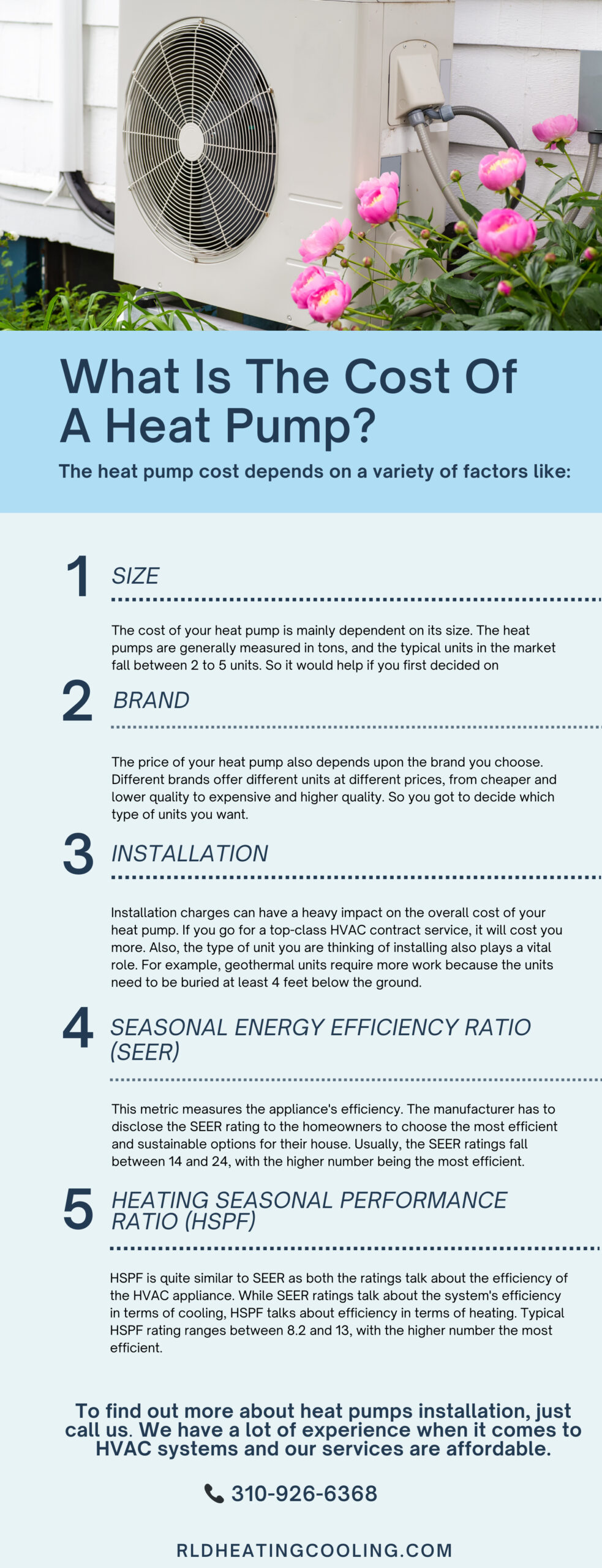
The heat pump cost depends on a variety of factors like:
- Size: The cost of your heat pump is mainly dependent on its size. The heat pumps are generally measured in tons, and the typical units in the market fall between 2 to 5 units. So it would help if you first decided on the size of the heat pump your house needs. Bigger the size of the system, the higher its price.
- Brand: The price of your heat pump also depends upon the brand you choose. Different brands offer different units at different prices, from cheaper and lower quality to expensive and higher quality. So you got to decide which type of units you want.
- Installation: Installation charges can have a heavy impact on the overall cost of your heat pump. If you go for a top-class HVAC contract service, it will cost you more. Also, the type of unit you are thinking of installing also plays a vital role. For example, geothermal units require more work because the units need to be buried at least 4 feet below the ground.
- Seasonal Energy Efficiency Ratio (SEER): This metric measures the appliance’s efficiency. The manufacturer has to disclose the SEER rating to the homeowners to choose the most efficient and sustainable options for their house. Usually, the SEER ratings fall between 14 and 24, with the higher number being the most efficient.
- Heating Seasonal Performance Ratio (HSPF): HSPF is quite similar to SEER as both the ratings talk about the efficiency of the HVAC appliance. While SEER ratings talk about the system’s efficiency in terms of cooling, HSPF talks about efficiency in terms of heating. Typical HSPF rating ranges between 8.2 and 13, with the higher number the most efficient.
The average cost of heat pumps is:
- Air source: $2000-$5500 (Installation cost ranges from $1300-$2000)
- Geothermal heat pumps: $3000- $6000 (Installation charges ranging from $10000-$30000)
- Ductless mini-split: $1000-$3500 (Installation charges ranging between $500-$1500)
- Gas-fired heat pumps: $3000-$6000 (Installation costs between $1300-$2000)
How much does a heat pump replacement costs?

The heat pump replacement cost usually ranges between $4900 and $12500. This range includes a lot of factors like the labor, cost of the equipment and other fees.
This range also includes a variety of system sizes and levels of sophistication, including variable-capacity heat pumps systems.
However, certain factors can directly impact the price of heat pump replacements; they are:
- Power/Capacity of the system.
- Efficiency.
- Modifications or changes to your existing system.
- Installation costs.
- The HVAC equipment you are not willing to replace.
- Line set protection.
- Tax credits and rebates.
How much does a heat pump installation costs?
A new heat pump costs $3875- $10000 depending on the size of your home, the brand you choose, the SEER ratings and the type of unit you install.
The mini-split ductless heat pump with four multi-zone indoor units can cost you around $10000 to install.
Also, there are a variety of heat pumps available in the market for you to choose from. The top three types of heat pumps usually preferred are:
- Central ducted air source heat pumps.
- Mini-split heat pumps.
- Geothermal units.
The geothermal heat pumps are one of the most pricey options as the installation cost can go as high as $22000 because of land excavation costs.
What are the factors affecting heat pump installation costs?

The total installation cost of your new heat pump depends on various factors. Using a heat pump to heat a few sections of your house might save you a lot of money on in-house handler unit material costs. However, if you’re considering using it as your central heating and cooling appliance, it can shoot up your overall installation cost.
Some of the factors that affect the installation cost are:
- The labor costs in your area. (Labour costs are cheaper in rural areas)
- If your ductwork needs to be installed or repaired.
- Brand of your unit.
- The size and square footing of the heating and cooling area.
- Local HVAC permit and installation fees.
- Price of the unit and the additional materials to be used.
- The season in which you install. (More pricey during busy seasons)
Air conditioner VS Heat pumps. What’s the difference?
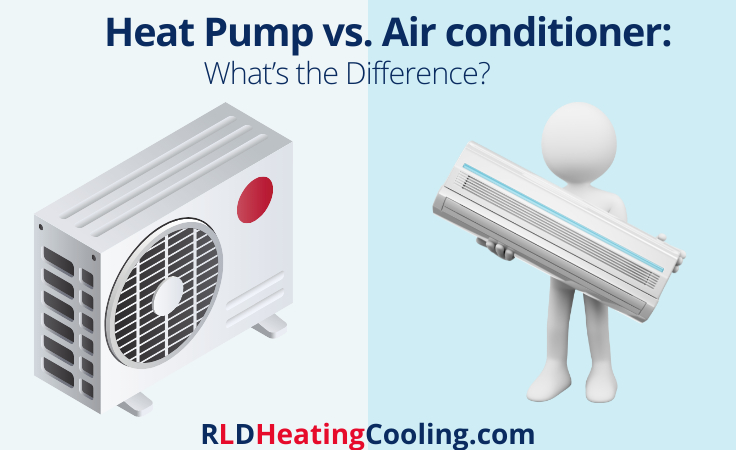
A heat pump and an air conditioning system use the same technology to cool your house. Both the systems also have the same energy-efficient systems.
Then what’s the difference? You must be wondering.
Well! There are some minor technical differences; heat pumps can work both ways; they can heat and cool, while the air conditioner can only cool your home. For an air conditioner to carry out both processes, you need to pair it with a furnace at your home.
Other than that, all the functions of the heat pump and the air conditioners are similar, having no difference in quality, coat and energy efficiency.
Gas furnace VS Heat pumps. What’s the difference?
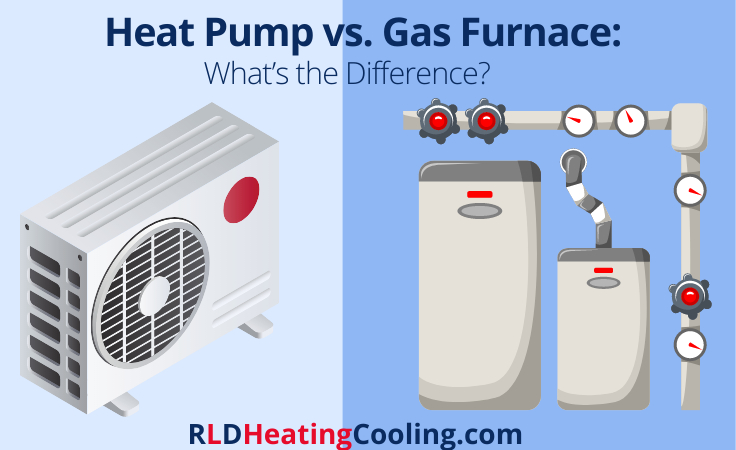
The main dissimilarity between a heat pump and a gas furnace lies in their functionality and process. While the heat pump functions on electricity and moves heat from one place to another, a furnace creates heat and runs on fuel.
Since it uses electricity, it is more energy-efficient. On the other hand, gas furnaces run on fuels and emit harmful substances that contribute to climate change.
Another difference is that heat pumps can also cool your house, cutting out the need to get a separate cooling system, while gas furnaces can only heat your house.
FAQs

Here are some of the questions people usually ask:
What are the disadvantages of a heat pump?
Heat pumps are getting more popular day by day, but that doesn’t mean they are suitable for every situation. Here are some of the cons of it:
- Heat pumps are pretty pricey to install.
- Not suitable for homes with poor insulation.
- If the weather is excellent, the yield declines.
- Heavy on electricity consumption.
- The radiators need to be replaced frequently.
- NoisyAre heat pump and HVAC the same?
No, a heat pump and an air conditioner are not the same. A heat pump can both heat and cool your house, but an air conditioner can only cool, and this is the primary difference between these two HVAC systems. An air conditioner or cooling system has to be paired with a furnace to provide heat in winters.
Which is better, a heat pump or HVAC?
Heat pumps push out more cool and hot air in volume than the energy it takes to run. Heat pumps are also advantageous and convenient to maintain because when you call for a maintenance service, the technician inspects both the HVAC parts to keep the system in its peak performance.
Is AC with heat pump good?
Like the regular HVAC system, a heat pump keeps your house cool by removing the hot and unwanted air inside your house outside.
But unlike air conditioners, heat pumps are not just restricted to cooling, but they can also heat your house when it is freezing outside.
So, if you have one, you don’t need an air conditioner.
Why Us?
SEE WHAT OUR FRIENDS HAVE TO SAY
Fantastic service. We decided to replace our heat pump, and after some research and getting the quotes, we went for RLD services. The ratings were good, and of course, the charges were minimal. Their manager Fin was very responsive and genuine and gave all the necessary details before the visit. Since the placement of the heat pump was in an odd location, we needed the help of a crane. Fin went out of his way to arrange a crane for our service. Tim, who helped us with the unit’s installation, was also super skilled and friendly. They suggested we install a noise reduction system because the main reason for replacing our previous unit was the loud noise. I asked a few questions, and he answered them so beautifully. Loved these guys.
–Simon B.
Our heat pump broke down suddenly, so we started looking for HVAC contractors. We diagnosed it with a contractor, and they quoted a hefty sum just for repair, and the new unit would take 20 days to arrive, even on special order. So, tired of the chaos, we finally called RLD. They were ready to repair for half the price quoted before, and they arrived the next day. Tim was super excellent and did the job nicely. My heat pump is working well. Thank you so much, RLD.
– Sheldon G.
Prompt response, communicated well and was very honest with the work. It was a pleasure working with RLD and having them fix our heat pump. Highly recommended.
– Penny J.
Had a great experience with RLD. Tim came on time and quickly assessed the problem with our split system heat pump. After finding the issue, he cleaned the problematic spot and voila! The system started running again. It was super smooth. Tim was efficient, skilled and friendly, and it was convenient to book an appointment with them. Loved them and won’t hesitate to call them again. Highly recommended.
– Leonard F.

call 310-926-6368
Contact 24/7 our scheduling department today to make an appointment.
Our Opening Hours
Monday 8:00 am – 8:00 pm
Tuesday 8:00 am – 8:00 pm
Wednesday 8:00 am – 8:00 pm
Thursday 8:00 am – 8:00 pm
Friday 8:00 am – 8:00 pm
Saturday 8:00 am – 8:00 pm
Sunday 9:00 am – 5:00 pm
Our Address
8040 Deering Ave #5
Canoga Park, CA 91304
